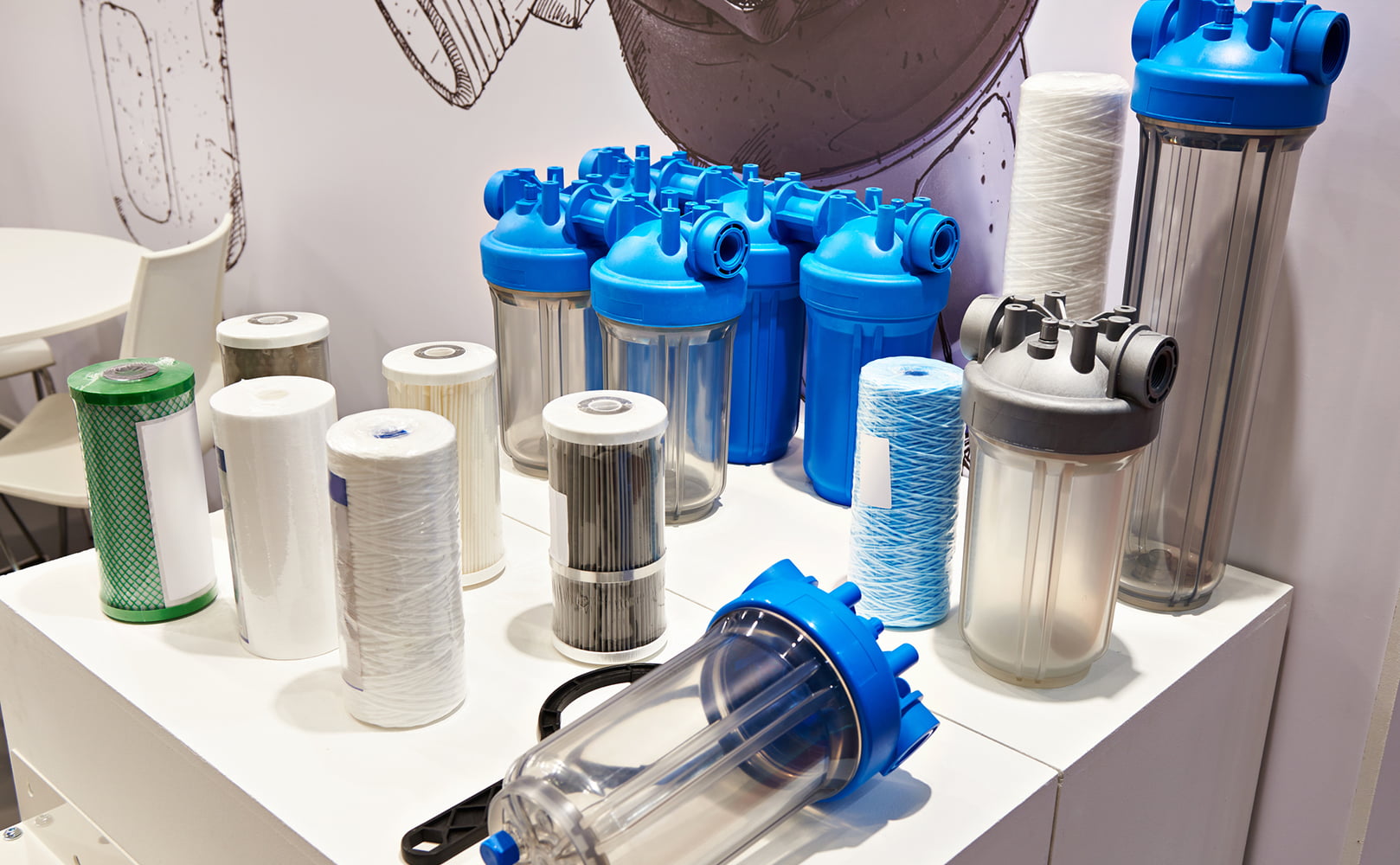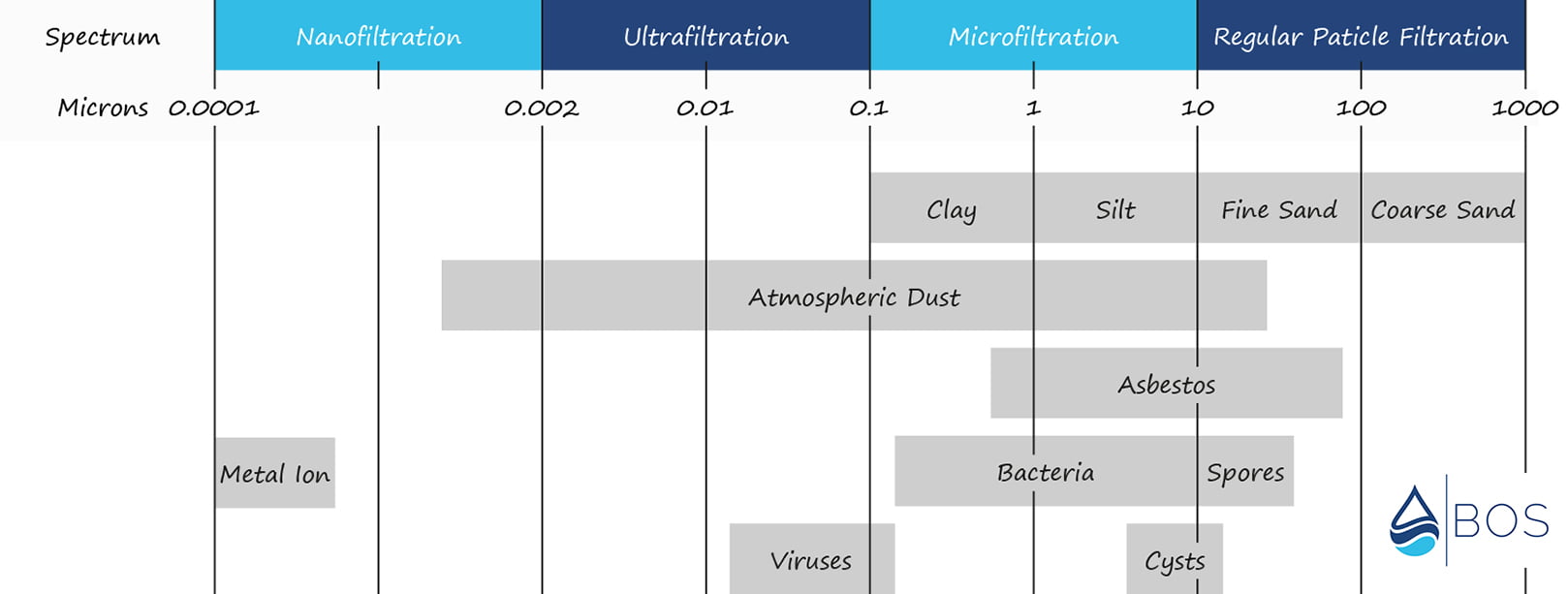What Is a Polypropylene (PP) Sediment Water Filter?
Written by: Gene Fitzgerald // Last Updated: Aug 15, 2023
This page may contain affiliate links. If you buy a product or service through such a link we earn a commission at no extra cost to you. Learn more.
Sediment filters can be used to remove dirt from your water supply; dirt which can harm your entire plumbing system causing clogging as well as your home appliances, like fixtures or water heaters.
Sediment filters come in different types, one of the most popular being PP (polypropylene) sediment filters.
But what is a PP sediment water filter exactly, and how does it work? Find out below!
Key Takeaways
- A PP sediment filter is a water filter made of polypropylene, a type of soft plastic.
- The most common types of polypropylene sediment water filters are pleated, string-wound, and melt-blown/spun.
- They purify water by removing sediments, like dust, clay, mud, or sand.
What Is a PP Sediment Filter?
A sediment filter captures and removes solid matter, like debris, dirt, and sand, from water. A PP sediment filter is a water filter or cartridge made of polypropylene; a type of soft, flexible plastic considered safe for humans.
Polypropylene appears to have greater chemical resistance and a longer life than conventional water filters and helps to purify water by removing coarse particles and sediments from it.
Sediments can be tiny or large enough to be seen by the naked eye and can damage home appliances or even the plumbing system. For this reason, they have to be removed. Flakes of rust, for example, can enter our water supply from corroded plumbing, while rainwater may carry soil, clay, or grains of sand into our groundwater supply.
This is where sediment filters come in, PP filters included. They are the first line of defense against debris, preventing particles from entering our water supply and impending our water systems’ performance. For one, sediment filters are employed in multi-stage filtration processes to protect the main filtration stages from clogging. Plus, they are used before UV water purifiers, water softeners, etc., too.
As a last note, keep in mind that pool filter cartridges are also a form of sediment filter and can block mud or clay from entering pool water.
The Different Types of PP Sediment Water Filters and How They Work
There are different types and configurations of PP sediment water filters to learn about and choose from. Here are the most popular variations:
Pleated PP Sediment Filters
Shaped like accordions, pleated PP sediment filters are made up of sheets of filter media. Sometimes, they are called surface filters, and the volume of pleated folds gives them more surface area than other sediment filters.
Now, pleated filters use their extensive surface areas to capture floating particles. When the pleats trap and hold the dirt, an extra layer is created on the filter, amplifying its efficiency.
Also, thanks to their large surface area, pleated polypropylene sediment filters can be manufactured to filter particles of specific sizes. Another advantage is that they are washable, meaning they can be reused.
String-Wound Filters
String-wound filters are made of wound cotton, polypropylene, or polyester string. The string is wound around a central core. Coarse dirt gets blocked on the surface, while finer sediments are trapped as the water moves through the inner string layers.
Melt-Blown and Spun Filters
Melt-brown or spun PP filters also use depth gradients to trap and remove matter from water. In other words, these filters have an inner core denser than their outer layers.
Bag Filters
Bag filters are rarer than the previous ones and made of polypropylene or polyester felt. They are super effective against sediments and process our water via tiny pores. These permeable pores range in micron size from 1 to 200.
Bag filters come in many styles and can be manufactured in high-density depth filter designs if required. They also have many applications. For instance, bag filters are used to process paints, solvents, resins, chemicals, and of course water.
Why Use a Polypropylene Filter (for Pre-Filtration)?
Because some PP filters are constructed of multilayers for high-end depth filtration, their superior structure makes them ideal for capturing particles throughout the whole cross-section of the cartridge, reducing surface binding.
Plus, PP sediment water filters combine cost-effectiveness and quality, providing exceptional filtration value. And they are available in many sizes and micron ratings.
As such, PP sediment filters are ideal for protecting your home’s plumbing system from damage caused by sediment-laden water. Plus, they are great as a first line of defense in any multi-stage water treatment process, protecting subsequent treatment stages from clogging.
Features and Benefits
As it should be clear by now, PP filters have lots of benefits, like:
- Multilayer structure for depth filtration.
- They come in a variety of micron ratings and sizes.
- Polypropylene is a type of plastic considered safe for humans since it treats water with nonneural pH, chemicals, or solvents.
- Cost-effective and of high quality: Value for money.
- Most PP filters meet NSF standards for sanitation and food safety in the United States.
What a PP Filter Removes
A PP filter removes matter like rust, dust, sand, and mud from tap or well water.
Finer filters can also catch bacteria, cysts, and even clay.
Applications
Polypropylene filters are among the most popular filter choices for home use. They are commonly used as:
- Standalone filters to clean private well water
- Pre-filters for water softeners to protect the softening resin from clogging
- Pre-filters for UV water purifiers for maximum disinfection effectiveness
- Pre-filters for other types of water filtration systems such as carbon filters
That said, PP filters are also extensively used in various industries, such as mining, metal hydroxide sludge, chemical manufacturing, wastewater treatment, and pigments and dyes.
What Micron Size Does My Sediment Water Filter Need to Be?
Most if not all sediment filters are micron rated. For example, a sediment filter cartridge could be rated at 5 or 10 microns. If you’re wondering how much that actually is, consider that human hair is about 70 microns thick, so 5 to 10 microns is a pretty small size.
Obviously, a filter with a lower micron rating can remove smaller contaminants.
As a rule of thumb, 50-micron filter cartridges are a good choice for water containing a lot of dirt. If you want to remove silt, choose a 1 or 5-micron sediment filter. If your water contains fine sand, 10 microns should be ideal.
Generally speaking, the micron rating of your PP sediment filter should match the size of contaminant you are dealing with in your water supply.
How Often to Replace a PP Sediment Water Filter
Even though PP sediment filters don’t have an expiration date, they have a lifespan.
How often you need to replace your filter depends on the source water’s quality, the amount of water you use, as well as the quality of the filter itself. In general, after 3 to 12 months of use, it’s recommended to change your filter.
Can You Reuse a Washed Filter?
Sure, you can. Cleaning and reusing your sediment water filter, especially if it’s a surface-type filter, is always a solid choice rather than replacing it with a new one every couple of months. Reusing your old filter up to a couple of times is both great for the environment and cost-efficient.
If you have any thoughts about the question, what is a PP sediment filter, please don’t hesitate to leave a comment below!
Information provided on BOS is for educational purposes only. The products and services we review may not be right for your individual circumstances.
We adhere to strict editorial guidelines. Rest assured, the opinions expressed have not been provided, reviewed, or otherwise endorsed by our partners – they are unbiased, independent, and the author’s alone. We fact-check all content for accuracy. It is accurate as of the date posted and to the best of our knowledge.




